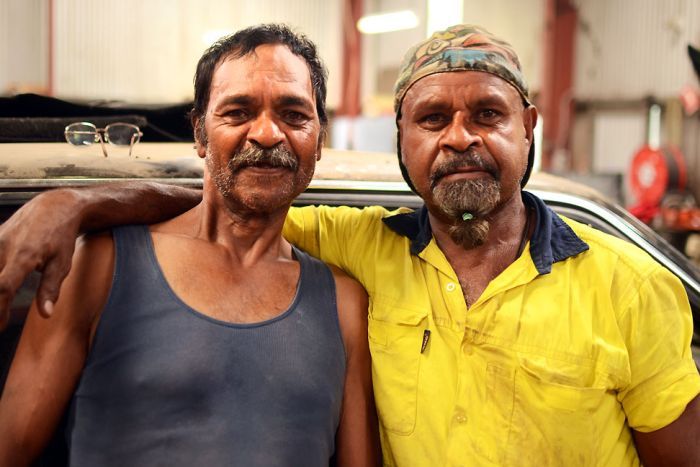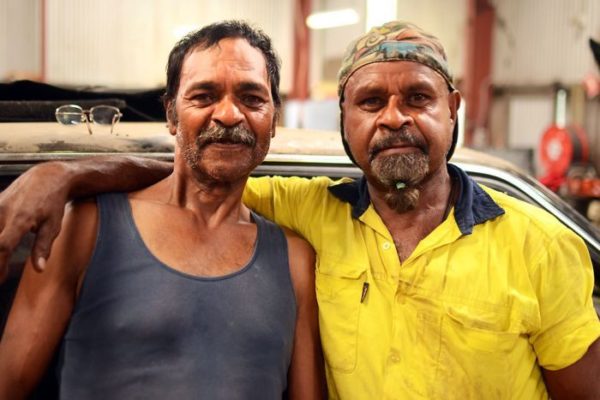
Image: Azeem Johnny Khan and his brother Tom, Aboriginal descendants of Afghan cameleers, in their Alice Springs workshop. (Janak Rogers)

By: Janak Rogers
Source: ABC
It’s a little known fact that Muslim visitors first arrived in Australia well before the British established a colony in 1788. From at least as early as 1650, Muslim fishermen from Makassar in Indonesia made annual trips to Australia’s far north coast in search of sea cucumbers—or trepang—which are highly valued in Chinese medicine and cooking. Indigenous Australians also journeyed to Indonesia, trading tortoise shells, tools, tobacco and other goods.
According to Dr John Bradley from Melbourne’s Monash University, the Makassans represent Australia’s first major, successful attempt at international relations. ‘They traded together. It was fair; there was no racial judgement, no race policy,’ he says.
Muslim Makassans and Australian Aborigines traded more than just goods; they also exchanged religious ideas.
‘If you go to north-east Arnhem Land there is [an Islamic presence] in song, it is there in painting, it is there in dance, it is there in funeral rituals,’ says Dr Bradley. ‘It is patently obvious that there are borrowed items. With linguistic analysis as well, you’re hearing hymns to Allah, or at least certain prayers to Allah.’
The Makassan trepang trade with Aborigines ended at the turn of the 20th century, killed off by heavy taxation and the Immigration Restriction Act of 1901. The relationship is still celebrated by certain communities in the far north, however.
Also in Australia’s coastal far north, the pearl industry drove a further period of contact between Indigenous Australians and Muslims. In the late 19th century, so-called ‘Malays’ from South East Asia came to Australia to work as indentured labourers in the local pearl shelling trade. They formed part of a thriving industry that, by the early 1900s, had turned the West Australian town of Broome into the centre of the world pearl shell trade. Many of these Malays were also Muslims who, much like the Makassan trepang traders, intermarried with local Aborigines and brought with them Islamic religious and cultural practices.
The ‘Afghan’ Cameleers
Between 1860 and 1930 up to 4000 cameleers came to Australia, bringing their camels with them. Many were indeed from Afghanistan, but also from India and from regions that later became Pakistan.
They played a key role in opening up the deserts, providing supplies to remote mission stations and helping to lay crucial national infrastructure like the Overland Telegraph Line, which in the 1870s enabled fast communication between Australia and the outside world; and the Ghan Railway line, which still runs today, crossing the the central Australian desert from north to south.
Far from their homes on the sub-continent, Afghan cameleers built makeshift mosques throughout central Australia, and many intermarried with Aborigines.
Raymond Satour, one of the many living descendants of the so-called Afghan cameleers, lives today in Alice Springs.
‘My grandfather’s father, he was a camel driver,’ says the 62-year old. ‘They had their own camels, over 40 camels. On the camel train itself, that’s when they met the Aboriginal people that were camping out in the bush.’
The Afghan camel trade ended in the 1930s, when motorised vehicles began to usurp the need for camels. Today, the hundreds of thousands of feral camels roaming Australia’s deserts are one of its legacies. The other legacy, of course, is the community of Aboriginal Afghans—not all of whom are practising Muslims, but nonetheless draw pride from their Islamic cultural heritage.
Brother Malcolm
Historically, the Makassans, Malays and Afghans have been the main links between Aborigines and Islam, but a new wave of converts found inspiration via US civil rights activist Malcolm X.
‘You don’t meet many Aboriginal converts who haven’t read the Autobiography of Malcolm X,’ says Mohammed*, an Aborigine who converted to Islam six years ago.
Malcolm X was an African-American civil rights leader and Muslim minister. After stints in prison, he became a member of the Nation of Islam, rising to become one of its most influential leaders. Eventually, he rejected the Nation of Islam and became a Sunni. He was assassinated in 1965.
‘Malcolm’s journey was unbelievable,’ says Justin Agale, an Indigenous man who converted to Islam 15 years ago. ‘Here was a man who was interested in social justice and in furthering the cause of his people, but he was also interested in his own spiritual journey to truth.’
Former World Champion boxer Anthony Mundine is one of Australia’s highest profile Aboriginal Muslims. Mundine, 38, is a member of the Bundjalung Aboriginal community and converted to Islam in 1999.
‘You have faith, you have faith in the almighty, the all-powerful,’ he says. ‘They can plan but only God is the greatest of planners. If God has destined me to be what I want to be or do what I want, nothing can stop Allah’s plan.’
-> See ABC’s Aboriginal Islam or download the episode Saturday 19 July 2014.
Today around 1000 people identify as Aboriginal Muslims, up from some 600 in the 2001 census.
Mohammed, once homeless and alcoholic, was drawn to Islamic discipline, which helped him turn his life around. He has now been sober for six years and holds down a steady, professional job—both of which he attributes to Islam’s positive effects on his life.
‘When I found Islam it was the first time in my life that I felt like a human,’ he says. ‘Prior to that I had divided up into “half this, quarter that”. You’re never a complete, whole thing.’
Like many Aborigines growing up in the city, he also feels cut off from his Indigenous culture. He rejects the criticism that he has faced, particularly from other Indigenous Australians, that he ‘turned his back’ on an Aboriginal way of life.
‘Where is my culture?’ he says. ‘That was cut off from me two generations ago. Here in New South Wales, where my Aboriginal descendancy comes from, I don’t have any traditional practices.’
For Mohammed, Justin Agale, Anthony Mundine and many other Aboriginal Muslim converts, Islam represents a positive spiritual journey, and a counter-narrative to the colonial dispossession faced by Indigenous people across Australia.
‘One of the attractive things about Islam for me was that I found something that was unbroken,’ says Mohammed. ‘Do you go for something that is going to take you out of the gutter and become a better husband and father and neighbour? Or do you search for something that you probably never had any hope of ever finding?’
*Name has been changed
Encounter invites listeners to explore the connections between religion and life—intellectually, emotionally and intuitively—across a broad spectrum of topics.



